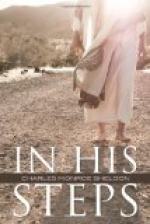“Coming back to Rachel,” began Virginia, “Rollin, why do you treat her with such a distinct, precise manner? I think, Rollin—pardon me if I hurt you—that she is annoyed by it. You need to be on easy terms. I don’t think Rachel likes this change.”
Rollin suddenly stopped. He seemed deeply agitated. He took his arm from Virginia’s and walked alone to the end of the hall. Then he returned, with his hands behind him, and stopped near his sister and said, “Virginia, have you not learned my secret?”
Virginia looked bewildered, then over her face the unusual color crept, showing that she understood.
“I have never loved any one but Rachel Winslow.” Rollin spoke calmly enough now. “That day she was here when you talked about her refusal to join the concert company, I asked her to be my wife; out there on the avenue. She refused me, as I knew she would. And she gave as her reason the fact that I had no purpose in life, which was true enough. Now that I have a purpose, now that I am a new man, don’t you see, Virginia, how impossible it is for me to say anything? I owe my very conversion to Rachel’s singing. And yet that night while she sang I can honestly say that, for the time being, I never thought of her voice except as God’s message. I believe that all my personal love for her was for the time merged into a personal love to my God and my Saviour.” Rollin was silent, then he went on with more emotion. “I still love her, Virginia. But I do not think she ever could love me.” He stopped and looked his sister in the face with a sad smile.
“I don’t know about that,” said Virginia to herself. She was noting Rollin’s handsome face, his marks of dissipation nearly all gone now, the firm lips showing manhood and courage, the clear eyes looking into hers frankly, the form strong and graceful. Rollin was a man now. Why should not Rachel come to love him in time? Surely the two were well fitted for each other, especially now that their purpose in life was moved by the same Christian force.
Chapter Seventeen
The next day she went down to the news office to see Edward Norman and arrange the details of her part in the establishment of the paper on its new foundation. Mr. Maxwell was present at this conference, and the three agreed that whatever Jesus would do in detail as editor of a daily paper, He would be guided by the same general principles that directed His conduct as the Saviour of the world.
“I have tried to put down here in concrete form some of the things that it has seemed to me Jesus would do,” said Edward Norman. He read from a paper lying on his desk, and Maxwell was reminded again of his own effort to put into written form his own conception of Jesus’ probable action, and also of Milton Wright’s same attempt in his business.
“I have headed this, ’What would Jesus do as Edward Norman, editor of a daily newspaper in Raymond?’




